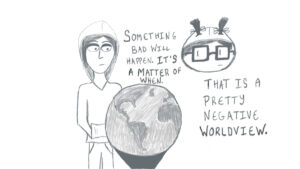Hardwired for Negativity
 “You have kind of a negative view of the world.” I thought for a moment about that statement. That I have a negative worldview is not news to me. I notice it when I write. I see it when I take a moment to think about how I feel about a situation. I am always picking out the negative and focusing on that.
“You have kind of a negative view of the world.” I thought for a moment about that statement. That I have a negative worldview is not news to me. I notice it when I write. I see it when I take a moment to think about how I feel about a situation. I am always picking out the negative and focusing on that.
What do I do with that as a statement in general?
Well, if you are me, you sit with that information. Then you research. I have theories about why my perceptions of the world, in general, are negative. My experiences growing up involved dealing with some of the darkest parts of human nature.
My brain was hardwired to have a particular worldview. And that worldview was negative. That was what survival looked like for me. I expected and prepared for the worst every day. I survived because I wasn’t waiting for the abuse to start. I knew it would, and I would brace myself for the onslaught.
Survival is Key
The human’s most basic instinct is still one of survival. Babies children are no different. Except those children are reliant on others to protect them. What happens then when caregivers do not offer that protection? And are the ones that children’s brains must protect themselves against?
The brain develops to view all things as unsafe because safety was never something the brain felt. But the danger of abuse, which is as familiar for abused children as love and comfort, is for children who are protected and kept safe by their caregivers.
Developing within a dangerous world hard wired my brain to be on alert all the time. Because survival for me wasn’t to run from lions, tigers, and bears (oh my!), it was to steal my brain against the psychological onslaught of abuse. To tune out the loud noises, the yelling, etc., and my brain developed to protect against that.
Children are concrete thinkers. The world is black and white, safe or unsafe. There is no neutrality when it comes to the developing brain. The negative parts take over the learning experience since few positive interactions occur. A world that is chaotic unknown becomes a negative place.
“Negative views of both the self and the world are commonly seen in individuals who have suffered psychological trauma. These negative cognitions are thought to be significant as they are likely to play a critical role in furthering, if not promoting, other symptoms and exacerbating the dysfunction sometimes seen after a traumatic event.” 1
“A general appreciation for how trauma can generate negative expectations has long-standing roots in the trauma literature. In the earliest versions of the PTSD diagnosis, the DSM included a “foreshortened sense of future” (American Psychiatric Association, 1980) in which survivors did not expect a career, marriage, or long life.”1
Plan? Me?
I remember believing that I would die by the time I was twenty-one years old. I had no real reason to believe that. Except for thinking if my future was as shitty as my present, then whoa, get me out of here. I want no part of that.
And so I didn’t plan. Not really. Sure I went to college, and I had a plan for that, but not really. I had several majors floating around between schools when I moved to New Mexico.
My mother liked to tell me that I wouldn’t amount to anything. I would likely end up dead in a ditch. That certainly could have played into my belief that I would not live long. But I think that was part of her abuse cycle. At the very core, I believe that that trauma affected my brain. I could not fathom a future.
Still Here
There are times that I still can’t believe that I am still around. I must have some purpose to be here still. Because I certainly did not choose the safest paths to be here today.
I chose the MOS in the military because it was the only MOS at the time that I had any chance at all to be in combat. And I wanted in on that. I wanted to die. Suicide wasn’t my path, so what could I do to end my life more nobly? The military.
I will tell you that I have not convinced myself that that last paragraph is how I honestly was thinking at that time. I wanted to survive, but I kept putting myself in harm’s way. Tempting fate, perhaps?
 The research that I have access to doesn’t directly correlate with trauma and negative world views. But I don’t think I would feel this way if I hadn’t been through years of trauma and abuse. I believe researchers haven’t found a way to explain this yet. But they will. Because having a negative worldview is an actual situation. And it can be debilitating.
The research that I have access to doesn’t directly correlate with trauma and negative world views. But I don’t think I would feel this way if I hadn’t been through years of trauma and abuse. I believe researchers haven’t found a way to explain this yet. But they will. Because having a negative worldview is an actual situation. And it can be debilitating.

Rainbow Bleeping Unicorns
I imagine when I don’t automatically interpret the world with negativity and darkness. Because darkness is out there, that is a fact. As long as there are people on this planet, darkness will always be an ever-present shadow looming over us. Because people have, can, and will continue to do horrible things to each other. I don’t think that will ever change because that is a part of human nature.
It isn’t healthy if I always saw unicorns and rainbows (or rainbow unicorns). A balance, then? I am adding that to my list of healing. Maybe a unicorn and a rainbow gliding through some grayness. It isn’t completely dark, but it isn’t all sunshiny either.
That is more akin to the world anyway. I want to see the world the way it is, with those gray, ambiguous areas that are just that; ambiguous. Instead of seeing grayness as a portent of something terrible happening instead of what I do. And damnit, I will be prepared for the inevitable shit storm that is about to rain down upon me.
Someday, I will walk into a crowded coffee shop and not immediately expect a shit storm. Nor will I already have thought about and planned out my reaction to the aforementioned shit-storm. Both of which are purely conjectured on my part. Do you know what happens most of the time? NOTHING.
 Imagine rainbow unicorns gliding through the gray ambiguity of the world. That must be a wonderful feeling to be in that moment, not worried about what will happen next.
Imagine rainbow unicorns gliding through the gray ambiguity of the world. That must be a wonderful feeling to be in that moment, not worried about what will happen next.
Source Cited
- Kimble, Matthew et al. “Negative world views after trauma: Neurophysiological evidence for negative expectancies.” Psychological trauma : theory, research, practice and policy 10,5 (2018): 576-584. doi:10.1037/tra0000324 https://www.ncbi.nlm.nih.gov/pmc/articles/PMC6544388/

0 Comments